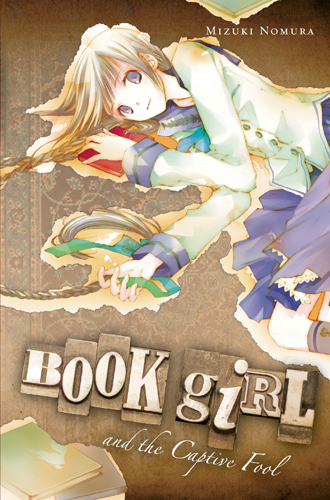By Mizuki Nomura. Released in Japan by Enterbrain. Released in North America by Yen Press.
By now I’ve grown somewhat used to how a Book Girl novel will feel. It will be based around a book of some sort (in this case, Saneatsu Mushanokoji’s 1919 novel Friendship) and the mystery plot will parallel the book in some way. It will flesh out the backstory of one of the minor characters we’ve met in the previous books. There will be dark, emotional themes that will connect with Konoha’s own thoughts and emotions. And in the end, Konoha will have grown a little bit more and moved on a bit from the girl in his past he can’t let go of.
But in general, the plot and mystery is not why anyone reads Book Girl. There were a few mystery aspects in this book, but I guessed at the most important one straight away, so they didn’t matter as much. However, it’s the characterization, style and prose that keep you coming back here, and in that respect Captive Fool is a worthy successor to the first two books.
This volume focuses on Konoha’s stoic and calm friend Akutagawa, and the discovery that much of his personality is a mask he puts on to conceal his past tragedies – both from others and from himself. Of course, this sounds a lot like what Konoha is doing now, and the irony is not lost on him. What’s more, the girl who was the focus of the first novel, Takeda, shows Konoha that being ‘cured’ of crushing emotional despair is not something that can happen over the course of a few weeks.
Much of the impetus of this book revolves around being unable to move on from a past tragedy, to the point where self-doubt and pressure make it impossible for you to do anything. Again, these novels are written for 15-17 year old readers, and I think these emotions would resonate well with them. How do you talk with someone after “ruining their life”? What if you make the exact same mistakes? What if one kind action turns out to be absolutely the wrong thing to do?
The author also manages to convey this to Konoha, the one who really needs to hear these words, in a way that doesn’t sound like everyone is acting as his therapist. The book Friendship mentioned above is being performed by the Book Club (and their assorted hangers-on) as a play, and so we see similar doubts and feelings play themselves out on three levels – elementary school (Akutagawa’s past), high school (Konoha’s present), and adulthood (the events of the novel/play). Growing up doesn’t always solve the problem.
Then there’s the ending to the book. I had discussed this with another reader, and it was felt that the revelation (which was a bit of a surprise, but not the complete shocker it was meant to be) was somewhat underwhelming, especially given that we’re only 3 volumes into what promises to be an 8-book “main story”. It seems a bit early for this particular plot gun to be fired off, in my opinion. But if nothing else, t shows us that when you are somebody’s mirror, you take on the same qualities as the person you are mirroring. Even if it’s unintentional.
Again, what I love most about this series is how much it makes me think about human nature. We see the growth of the characters, and even though it’s through artificial “what’s the mysterious tragic past of the novel?” means, that doesn’t make it less valid. And yeah, given the arc, I suspect the next book will focus on whatever demons Kotobuki has. But the writing and characters really make me want to find out what happens next. A great page turner, highly recommended.


I love the Book Girl novels. I read the first two installments and can’t wait to get my hands on the third one. One of my favorite light novels.
I totally agree. I’m looking forward to this one, too!